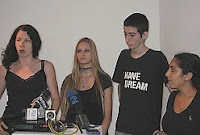
For Simcha's afikomen present (yes, that's right, afikomen. We could be better about giving presents in a timely manner) Rena promised to take Simcha into Yerushalayim for a day. She finally got around to that day this week, and decided to take him into the city on Thursday. I suggested that we take him to go by a Lulav and Etrog set - something that neither Simcha nor Rena had ever experienced.
The Lulav-buying experience has changed significantly over time. When I grew up, we bought our lulavim at Rabbi Anemer's house - he's the rabbi of the Young Israel where I grew up. (I have no idea if he still sells the four species or not.) He had a ping-pong table in his basement where he spread out the lulavim and etrogim. People would come into his home, say hi to his wife cooking something in the kitchen, and gingerly descend the narrow set of stairs down to the basement, where we - his students - would be sitting, hours on end, cutting our fingers binding lulavim together into sets; sorting kosher hadasim from non-kosher; grading etrogim. We did everything, from cleaning the lulavim with a toothbrush to assembling the final sets. Some people wanted to stand around and choose each and every piece. Others were quite happy to be handed a finished set, pay the rabbi quickly and be on their way.
It was in that musty basement that I learned how to choose a lulav: how to look for the straightness of the spine, like a guitar player checking out a potential new instrument. I learned to spot what was the beginnings of a split at the top (truly the most challenging aspect of lulav-selection), and the various blemishes endemic to the etrog.
But times seem to have changed. Nowadays, most arba-minim sellers have already graded their wares and divided them by price. You can't really find a gem for cheap; they know, and have sorted the good ones from the "cheap" pile. Most bookstores in America sell the sets already assembled. The hadasim come in plastic bags, complete with hechsherim and grading. I missed the old way - the way that I used to choose a lulav; zillions to look at, waiting for the one that called out to me, instead of buying a sealed box hoping that I got lucky.
So we went to Machane Yehuda, one of several locations where the municipality of Jerusalem had constructed outdoor markets to sell arba minim. To get to the tent, we walked through the market. I had forgotten about the onslaught of colors and smells; the closed quarters and traffic jams, as we squeezed our way past stalled tomato carts and overflowing spice stalls.
At last we emerged and made our way to the arba minim. It was as I had imagined: table after table of arba minim of varying colors, textures, shapes, and of course, prices. I saw something I had never before seen: an orange etrog - completely and totally orange. Was it kosher? I have no idea.
We started moving from table to table to get a sense of price and merchandise. I showed Simcha the basics of arba-minim shopping: is it better to get one with the brown sediment still on? What happens if it falls off? What's a good yellow, and what's a gold that will turn brown on the second day of Chol Hamoed.
I ended up buying the separate elements of my set from a single table. 50 shekel for my lulav; 60 for my etrog. 50 for the hadasim. (I only bought grade A - there were three kinds of grade "a" hadasim. I opted against the 80 shekel AA hadasim. That seemed a bit much.) 5 for aravot, and another 10 for the plastic ziplock bag. I bargained down to 160 shekel, and thought I had done well.
But the salesman at the very next table had been barking, continually for a least a half-hour: "Fifty shekel for a set! Fifty shekel! An entire set!" I set Simcha to work. He chose an etrog and lulav, and even got a plastic zipper bag, all for fifty shekel. Sure, mine were better pieces individually. But were they three times better? I wondered. Either way, it was far, far less than the ninety dollars I had paid in America, I kept reminding myself.
We made our way back to town, stopping in a clothing store (for Rena) where we bumped into a couple visiting from Teaneck. The man noticed my lulavim, and after I told him where we had bought them asked how much I paid.
"Fifty", I said, pointing to Simcha's, "and one-sixty", holding mine aloft. The difference in price surprised him.
"What's the difference between them?" his wife wondered.
"Let me see your diamond," I said. "What's the difference between a really expensive diamond and a cheap one? Color, cut and clarity. Truly subtle differences. The same applies here. Not much difference to the unschooled, but a world of difference if you know what to look for."
I think I sounded convincing.
At the lulav tent, I eventually settled on a particular table and started comparing etrogim.
Rena stood back the whole time, kind of taking the scene in. After a while, I asked her what she thought of a particular etrog. Was this one better? Or this one. She said that she found the whole thing kind of distasteful. "It seems so external," she said. "Isn't Judaism supposed to be about internals, and not what something looks like on the outside? You have no idea where that etrog is completely rotten on the inside."
True enough, I said. But the Torah says that we're looking for
hiddur. In this case external beauty really does matter. But as I got down to the nitty-gritty of choosing an etrog, I found myself having trouble making a definitive choice. If I saw one that I liked, something about its color bothered me. Every one I picked up was nice in one way but lacking in another. One gorgeous etrog suffered a small bump at the top (bad sign). Another had great bumps, but lacked a certain something. It just didn't "call out" to me. After a while I began to realize that there wasn't the perfect etrog. It doesn't exist. It's a question of finding the one with the qualities that I liked best.
And maybe that's the Torah's message about beauty. Yes, there are objective qualities to look for in an etrog: it must be whole and complete, fresh and unblemished. But when you start to look deeper, everything grows subjective. Yellow or green? Pitom or not? Bumpy or smooth? There are no "right" answers to those questions.
At that point, beauty really is in the eye of the beholder.
 A while back I started listening to podcasts during my commute, while I run, do the dishes, you name it. The best way to listen to podcasts, is on an Ipod, which I love. (It's really a fantastic blend of hardware and software.) My cousin, who knows that I run, graciously sent me a Nike+Ipod kit. Basically, it's a little pod that you put in your Nike shoe (which I happen to have), which tells your Ipod how fast you're running and how far you went, and helps you keep track of your runs. It sounds kinda silly, but it really does help. For some reason, I want to hear that lady tell me, "Congratulations. You've reached your goal."
A while back I started listening to podcasts during my commute, while I run, do the dishes, you name it. The best way to listen to podcasts, is on an Ipod, which I love. (It's really a fantastic blend of hardware and software.) My cousin, who knows that I run, graciously sent me a Nike+Ipod kit. Basically, it's a little pod that you put in your Nike shoe (which I happen to have), which tells your Ipod how fast you're running and how far you went, and helps you keep track of your runs. It sounds kinda silly, but it really does help. For some reason, I want to hear that lady tell me, "Congratulations. You've reached your goal."














